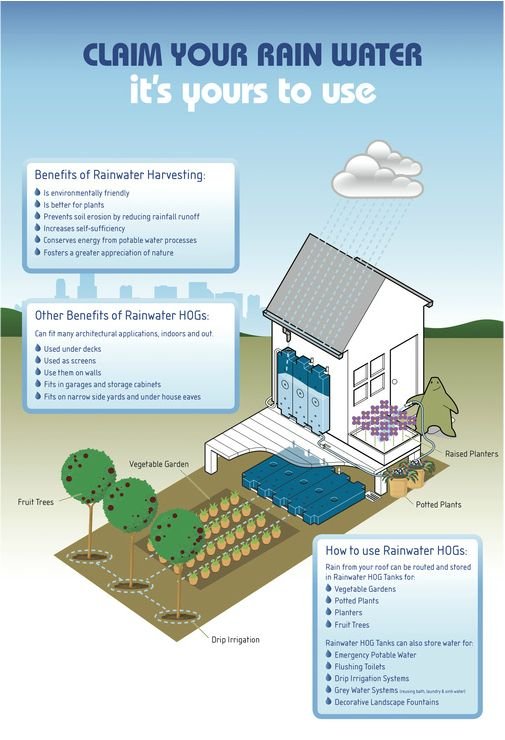Government Regulates Rainwater (Research Paper)

When I was a child, I spent most of my time outdoors enjoying nature. My mother would always tell me to play outside and not come back in the house until the street lights came on. So naturally, I would explore all the land around. As I grew up, I started learning more ways to survive outdoors, whether it was building a shelter or making fish traps in the stream nearby. I also learned very quickly that your body needed clean water. Georgia heat in the summer could be brutal on your body. So, I started learning ways to catch rainwater so when I was down at my hut, I could have clean drinking water.
Some years ago, I read a news article covering the collection of rainwater and how some state and/or local governments were putting bans on the practice. I found it crazy that it was possible to put a restriction on humans collecting rain. My mind began to reel. What does the government have to gain from this? What is the governments reasoning behind it? I do not have the answers now, but I do intend to find out “Why state and/or local governments pass regulations on the collection of rainwater.”
I began my research by googling “water collection.” I figured this could help direct me in the right direction in answering my question. The article I found was from The Alternative Daily, “Rain Barrels Are Illegal in These States (Crazy Right?)”. I learned that the correct term is “water harvesting” and the reason why it is/was illegal is due to water scarcity in the American West. “Prior Appropriation” allows claimed water sources from hundreds of years ago to be passed down for generations. If you were caught water harvesting, it could land you jail time. If you diverted the natural flow of rainwater, it could be considered stealing from prior appropriated water sources. States like Texas, however, are at the forefront for making water harvesting legal for its citizens to help decrease the strain on public water works.
Prior Appropriation began when “miners in Colorado experienced water shortages and developed a system to divide water based on a priority system”(Fox News, 2016). At this point, I did not know much about prior appropriation. The website www.ncsl.org was one of my most helpful internet sites I encountered during the research. It provided up to date laws on water harvesting. In 2016, Colorado passed a law that allows water collection for gardening and irrigation purposes. Rhode Island passed House Bill 7070 (2012) to provide tax credits for their citizens collecting 50 gallons or more of rainwater.
At this point, my thought process was to investigate “Prior Appropriation, ” so maybe that could lead me to the “why” in my question. In the Encyclopedia of politics of the American West, by Steinberg (2013), it provided a wealth of knowledge about prior appropriation. It began when pioneers started homesteading the American West and during the gold rush. In those times, many conflicts amongst homesteaders and miners came from water sources. The West “lack[ed] of arable land [and] compete[d] for agricultural interests” (Steinberg, 2013). The government intervened by settling the disputes by dividing the water system based on “first in, first served” (pg.547-548).
The next part of my research led me to the American South-East. I wanted to find out the differences between the West and East US regarding water harvesting. In Resources, Conservation & Recycling, I discovered North Carolina had a drought in 2007 that changed the citizen's water usage lifestyle. The studies documented results from three sites concluded that water harvesting, in the South-East, can be used to alleviate the burden on government water supply.
Texas, created the Rainwater Harvesting Evaluation Committee (HB 2430) in 2005 to build recommendations on how to implement rainwater collection systems. California, being ground zero for the gold rush, I thought would have strict laws on water harvesting, but in 2012 Governor Brown passed the Rainwater Capture Act that allowed the population to gather water to minimize commercial water use.
In the beginning, I was disgusted with how the government could restrict one of our natural personal liberties. Being raised in Ga, we never had issues where droughts were discussed. So, the thought that someone could go to jail for collecting rainwater seemed absurd.
After hours of research, I started homing in on “Prior Appropriation,” which was the foundation of water harvesting laws. History, in general, is a passionate subject of mine. Absorbing everything I could about the subject turned me from being completely against government oversight on water harvesting to a neutral stance. The fact that the history dated back to when we were homesteading the West for the first time, and the California gold rush, led me to understand “why” these laws were in place. It was not a greedy government trying to keep us on a leash; it was to help alleviate territorial arguments for claimed water sources.
This research project taught me about a subject I had little knowledge about but still had a strong opinion towards. It was a real eye-opener on how much as a society we have progressed. The only question I have after completing this paper is in general, how quickly will other states follow suit to pro-water harvesting and implement policies that allow for growth in water harvesting. This issue will only be answered in time, over many years.